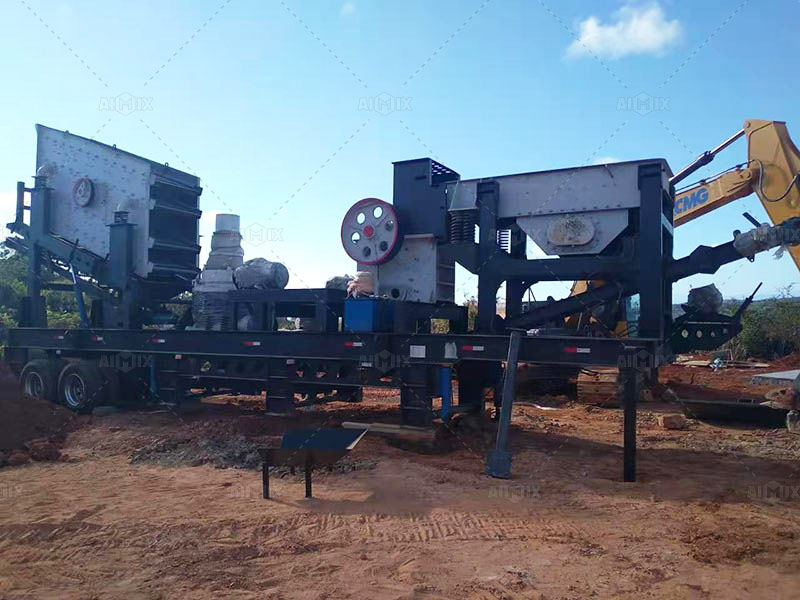When it comes to selecting the right aggregate crusher plant for your construction or mining needs, choosing between mobile and stationary options can be a pivotal decision. Both types of plants offer distinct advantages and limitations, and understanding these differences is crucial for optimizing performance, efficiency, and cost-effectiveness. This article will explore the key differences between mobile and stationary aggregate crusher plants to help you determine which option best suits your project requirements.
Understanding Mobile Aggregate Crusher Plants
Mobile aggregate crusher plants(plantas chancadoras de agregados) are designed for flexibility and ease of transportation. These plants are mounted on wheels or tracks, allowing them to be moved from one location to another with relative ease. This mobility makes them particularly valuable for projects that require frequent relocation or are situated in remote or challenging environments.
Key Advantages of Mobile Aggregate Crusher Plants
1. Flexibility and Mobility
The primary advantage of mobile aggregate crusher plants is their flexibility. They can be transported to different job sites, making them ideal for projects that involve various locations or require a temporary setup. This mobility is especially beneficial in construction projects that span large areas or need to adapt to changing site conditions.
2. Quick Setup and Operation
Mobile plants can be set up and operational quickly compared to stationary plants. This rapid deployment allows for immediate processing of materials, reducing downtime and increasing productivity on site. The ease of setup also minimizes the need for extensive site preparation.
3. Reduced Transportation Costs
For projects where the aggregate needs to be processed close to the source material, mobile plants eliminate the need for transporting raw materials over long distances. This can lead to significant savings on transportation costs and reduce the environmental impact associated with hauling materials.
Considerations for Mobile Aggregate Crusher Plants
1. Limited Capacity
Mobile aggregate crusher plants typically have a smaller processing capacity compared to stationary plants. If your project requires handling large volumes of material, you may need to consider whether a mobile plant can meet these demands or if a stationary option is more appropriate.
2. Durability and Maintenance
Due to their mobility, these plants may be subject to greater wear and tear. Regular maintenance and repairs are essential to ensure optimal performance and longevity. The components of mobile plants are designed to be robust, but their frequent relocation can impact their overall durability.
Exploring Stationary Aggregate Crusher Plants
Stationary aggregate crusher plants are fixed installations designed for high-capacity production. These plants(Estas plantas trituradoras de piedra) are typically set up in one location and are suited for projects with a stable site or long-term processing needs. They are often used in large-scale operations where high production volumes are required.
Key Advantages of Stationary Aggregate Crusher Plants
1. High Capacity and Efficiency
Stationary aggregate crusher plants generally offer higher processing capacities and greater efficiency compared to their mobile counterparts. They are built to handle large volumes of material and are ideal for projects with substantial production requirements.
2. Durability and Longevity
With a fixed installation, stationary plants are built to be more durable and can handle extended periods of continuous operation. Their components are designed for heavy-duty use, resulting in lower maintenance needs and longer operational lifespans.
3. Enhanced Customization
Stationary plants can be tailored to meet specific project needs, including the ability to incorporate additional equipment and features. This customization allows for more precise control over the crushing process and the production of specialized aggregate sizes.
Considerations for Stationary Aggregate Crusher Plants
1. Site Preparation and Installation
Stationary aggregate crusher plants require extensive site preparation and a fixed location for installation. This can involve significant time and cost for setup, including the construction of foundations, access roads, and other infrastructure.
2. Limited Mobility
Unlike mobile plants, stationary plants are not designed to be relocated easily. If your project involves multiple sites or frequent changes in location, a stationary plant may not be the most practical choice.
Making the Right Choice for Your Needs
When deciding between mobile and stationary aggregate crusher plants, consider the following factors:
- Project Duration and Location: For short-term or multi-site projects, a mobile plant may offer greater flexibility. For long-term or large-scale operations, a stationary plant might be more suitable.
- Production Capacity: Assess the volume of material you need to process. Mobile plants are ideal for smaller, more flexible projects, while stationary plants excel in high-capacity production.
- Budget and Costs: Evaluate the costs associated with setup, maintenance, and operation. Mobile plants offer cost savings on transportation, while stationary plants may have higher initial setup costs but offer long-term durability.
Conclusion
Choosing the right aggregate crusher plant depends on your specific project requirements, including mobility, capacity, and site conditions. Mobile aggregate crusher plants offer flexibility and quick setup, making them ideal for dynamic or remote projects. In contrast, stationary aggregate crusher plants provide high capacity, durability, and customization for large-scale, long-term operations. By carefully assessing your needs and considering the advantages and limitations of each option, you can make an informed decision that aligns with your project goals and operational demands.

Comments
No comments yet. Be the first to react!